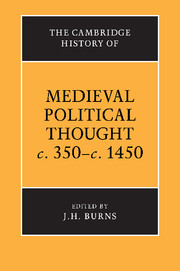Conclusion
Published online by Cambridge University Press: 28 March 2008
Summary
Only the briefest of notes is either appropriate or necessary by way of conclusion to a book of this kind. Yet there are questions which will naturally be asked and which it is necessary to consider even if they cannot be completely or definitively answered. There are questions, already touched on in the Introduction, as to method and approach – questions which may perhaps be encapsulated in the question whether these pages have reflected any significant change or development in the histriography of the subject. It can perhaps be claimed that there is evidence of such a shift, both in the range of the evidence considered and in at least some of the perspectives in which it has been analysed. One illustration of both points may be found in the thoroughness with which ecclesiological concepts have been considered, whether in the Carolingian and post-Carolingian period or in the context of fifteenth-century conciliarism–the latter in particular a case in which earlier historians would have taken a more narrowly ‘political’ view of the material. Again–a not unrelated point–it is surely the case that the evidence of canon law has taken a much more prominent place here than would have been the case even in the early decades of this century. This is not to say that the canonists were neglected in earlier account: Carlyle, for example, drew extensively on canonistic sources, and devoted the greater part of his second volume to ‘the political theory of the canon law’ from the ninth to the thirteenth century.
- Type
- Chapter
- Information
- The Cambridge History of Medieval Political Thought c.350–c.1450 , pp. 649 - 652Publisher: Cambridge University PressPrint publication year: 1988
References
- 1
- Cited by



